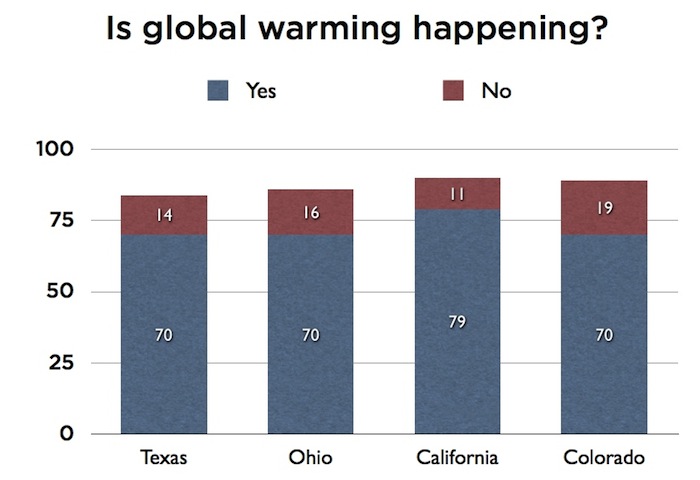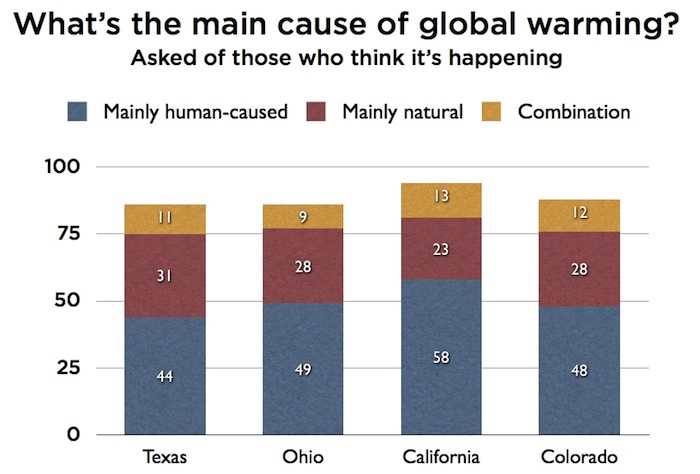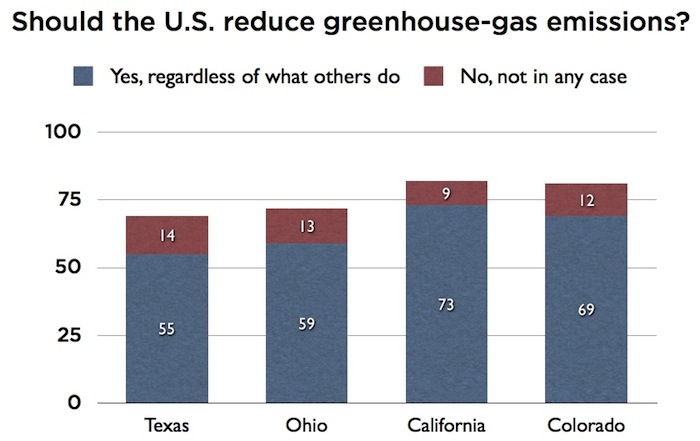Judging by the rhetoric and actions of their top state officials, Texans and Californians are an immense distance apart in their attitudes on climate change.
New poll results from Yale University suggest otherwise, however. In fact, the results from recent opinion surveys in resolutely red Texas, deep blue California and a pair of swing states in the last two presidential elections – Ohio and Colorado – indicate that Texans aren’t dramatically different on climate science and policy questions.
The Yale polls found, for instance, that Texans are more like than unlike residents of the other three states in a number of key ways:
They overwhelmingly think global warming is happening. Substantially more think this warming trend is mainly caused by human activity or a combination of human and natural causes than think it mainly stems from natural variability. Majorities want government officials at all levels to do more to address global warming. And a strong majority thinks the U.S. should act alone to reduce greenhouse-gas emissions, regardless of what other nations do.
The polls do show Texans are generally less in accord with the overwhelming scientific consensus that climate change is mostly caused by heat-trapping pollution and with the idea that action against this trend is needed. Among the four states reflected in the new Yale polls, more Californians correctly perceived the existence of that consensus and favored climate action.
But based on the poll results, there doesn’t appear to be anywhere near as big a gap between Texans’ and Californians’ attitudes as there has been between the stances of top elected officials in the two states in recent years. While Texas’ top leaders have scoffed at climate science (Gov. Rick Perry) and sued to stop federal regulations to cut greenhouse emissions (Perry’s fellow Republican, Attorney General Greg Abbott), the last two California governors have championed an aggressive state law to limit climate-changing pollution (Republican Arnold Schwarzenegger) and scorned climate-change “deniers” (Democrat Jerry Brown).
The state polls, which were separately released in recent weeks by the Yale Project on Climate Change Communication, showed what appears to be less difference in public opinion between Texans and Californians than between the positions of their states’ top officials.
For instance, 70 percent of Texans said they think global warming is happening, compared to 79 percent of Californians. 70 percent also think it’s happening in Ohio and Colorado. The percentages who say the warming trend isn’t occurring ranged from 19 percent in Colorado to 16 percent in Ohio, 14 percent in Texas and 11 percent in California.
Of the four states, fewer Texans who think the warming trend is happening also think it’s mainly manmade (44 percent) than in the other states – 58 percent say that in California, 49 percent in Ohio and 48 percent in Colorado.
But that 44 percent in Texas is still a notably larger number than the 31 percent who think it’s mainly natural. In Texas, 11 percent of those who say warming is occurring think it’s because of a combination of human and natural causes.
Scientific confidence that warming is mainly human-caused has been growing stronger in recent years. In a major new report released today, the Intergovernmental Panel on Climate Change, a U.N.-sponsored group that summarizes scientific findings, declared that the “evidence for human influence has grown” since its last such report in 2007: “It is extremely likely [meaning a likelihood of 95-100 percent in IPCC terminology] that human influence has been the dominant cause of the observed warming since the mid-20th century.”
In May, a study led by researchers at Australia’s University of Queensland concluded that about 97 percent of 4,000 scientific papers published in many nations had “endorsed” the idea of human-caused warming, demonstrating there is “strong scientific agreement about the cause of climate change, despite public perceptions to the contrary.”
Public misunderstanding about the high degree of scientific agreement that exists on the human causation of the warming trend was reflected in the Yale survey results – in Texas and the other three states. In Texas, 47 percent think there is “a lot of disagreement” about the climate phenomenon among scientists, compared to 43 percent who think most scientists agree. California was the only state in the four polls in which residents correctly think most scientists are in agreement, but even there, 37 percent think they are not.
Despite seeing more scientific discord than there is on the issue, however, Texans joined residents of the other three states in strongly backing more government action to address global warming. The following percentages think officials at different levels of government should do more:
- Texas – Congress (62 percent), local officials (60), governor (59), president (57).
- Ohio – Congress (59 percent), local officials (53), governor (54), president (54).
- California – Congress (65 percent), local officials (58), governor (60), president (59).
- Colorado – Congress (58 percent), local officials (53), governor (52), president (53).
On another question, Texans, like residents of the other three states, strongly rejected the argument made by a number of prominent Texas politicians (and others) that the U.S. should not act alone to reduce greenhouse-gas emissions. In part, they assert that U.S. reductions without action by other countries would hurt the U.S. economy and that it would not be effective in curbing climate change.
Nonetheless, a strong majority of Texas poll respondents – 55 percent – said the U.S. should cut emissions regardless of what others do. Only 14 percent of Texans said the U.S. should never reduce emissions in any event. Smaller percentages said the U.S. should cut emissions in certain instances – 6 percent said that should happen if other industrialized nations also reduce greenhouse gases and 11 percent said the U.S. should act only if industrialized and developing nations do so.
In the other three states, majorities also favored U.S. reductions in heat-trapping pollutants even if there’s no similar action by other countries – 59 percent in Ohio, 73 percent in California and 69 percent in Colorado. The percentages opposing U.S. reductions in any case were similar to the Texas finding – 13 percent in Ohio, 9 percent in California and 12 percent in Colorado.
These selected findings from the Texas poll were among those highlighted by the Yale researchers:
Among Texans who believe global warming is happening, large majorities expect to see a myriad of negative effects over the next 50 years. Nearly all anticipate more heat waves (95 percent) and increased drought and water shortages (92 percent) in Texas due to global warming. More than eight in ten believe Texas will experience worse storms, hurricanes, or tornadoes (87 percent), declining numbers of fish and native wildlife (86 percent), and increased allergies, asthma, infectious diseases, or other health problems (85 percent) due to global warming.
[In addition to the majorities favoring more government action on global warming] even larger numbers of Texans believe that citizens themselves (69 percent) and corporations and industry (68 percent) should be doing more to address climate change.
Texans think global warming is important and are worried about it. About three in four (73 percent) say the issue of global warming is at least somewhat important to them personally. About half (54 percent) are at least somewhat worried about it.
Among those who believe global warming is happening, solid majorities believe it is currently having a large or moderate influence on the severity of heat waves (84 percent), drought (80 percent), and wildfires (72 percent) in Texas.
About half of Texans (52 percent) say they have personally experienced the effects of global warming.
Many Texans believe that individual action, and especially collective action, can be effective in addressing global warming. Among those who believe global warming is happening, most (89 percent) say their own actions would reduce their personal contribution to global warming at least a little. Virtually all Texans who believe global warming is happening say that if the same actions were taken by most people in the U.S. (96 percent) or around the world (96 percent), it would reduce global warming a little, some, or a lot.
About four in ten Texans (43 percent), a plurality, say that switching from fossil fuels to clean energy sources would increase economic growth and the number of jobs. By contrast, only three in ten (29 percent) say a switch to clean energy would decrease economic growth and the number of jobs.
Many Texans are unsure that people will rally to do what’s necessary to reduce global warming. One in three (35 percent), a plurality, believes humans could reduce global warming but that it’s unclear at this point whether we will do what is needed. Relatively few are convinced that people can reduce global warming and will do so successfully (8 percent).
More than four in ten Texans (44 percent) say that, in the past 12 months, they have rewarded companies that are taking steps to reduce global warming by buying their products at least once, and 40 percent would like to do it more often in the next 12 months. Moreover, one in three (32 percent) have punished companies that are opposing steps to reduce global warming at least once by not buying their products during the past 12 months, and 32 percent would like to do this more often in the coming year.
A majority of Texans (58 percent) say that President [Barack] Obama is very or somewhat believable when speaking about energy- and climate-related issues. Half (50 percent) say Governor Rick Perry is very or somewhat believable regarding the same issues and four in ten (43 percent) say he is not very or not at all believable. Fewer than half of Texans say that either Senator Ted Cruz (46 percent) or Senator John Cornyn (44 percent) is believable regarding energy and climate issues.
– Bill Dawson



